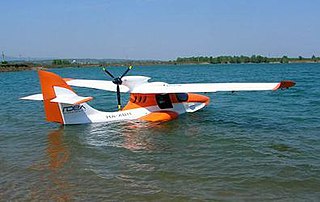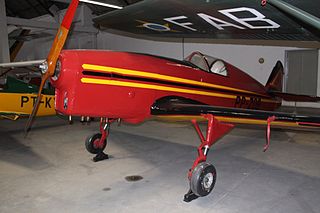Related Research Articles

The Göppingen Gö 9 was a German experimental aircraft built to investigate the practicalities of powering a plane using a pusher propeller located far from the engine and turned by a long driveshaft.

The Heinkel He 116 was an extremely long-range mail plane designed and produced by the German aircraft manufacturer Heinkel.

The Dornier Do 27 is a German single-engine STOL utility aircraft that was designed and manufactured by Dornier GmbH. It was notable for being the first mass-produced aircraft in Germany following the end of the Second World War.

The Dornier Do 214 was a proposed large long-range flying boat, developed by Dornier in World War II.

The Colonial Model C-1 Skimmer was an American small single-engined amphibian flying boat built by the Colonial Aircraft Corporation. It was the start of a line of very similar aircraft designed by David Thurston.

The Siebel Si 202 Hummel ("Bumble-bee") was a German light sportsplane of the late 1930s. It was an angular low-wing monoplane, which could be powered by a variety of small engines.

The Hirth Hi 27 Acrostar was designed by Arnold Wagner to win aerobatic competitions, in part by having handling independent of orientation, upright or inverted. A single engine, single seat low-wing monoplane, it was built in West Germany by Wolf Hirth GmbH in the early 1970s, and dominated Championships for a brief period.

The Fieseler Fi 99 Jungtiger was a German sports aircraft prototype, produced by Fieseler company. The aircraft was a low-wing two-seat aircraft with an enclosed cabin. It was powered by a Hirth HM 506A engine, producing 160 hp (119 kW).
The Gardan GY-120 was a single engine, parasol wing ultralight seating two in tandem, designed and built in France in the 1980s. It did not go into production.
The Tisserand Hydroplum is a small amphibious aircraft with a single, pusher engine, built in France in the 1980s. Originally a single-seat, high-wing monoplane, it was developed into a two-seat biplane for production in kit form as the SMAN Pétrel.
The O'Neill Model J Magnum, also called the Magnum Jake and the Magnum Pickup, is a homebuilt aircraft design for bush flying operations similar to the de Havilland Beaver.

The Pasotti F.9 Sparviero was a four-seat, low-wing touring aircraft, built in Italy in the 1950s. Designed by Stelio Frati, it was a single-engine version of his earlier twin-engined Airone. Only one was built.

The Idea Hydropteron is a Hungarian light-sport aircraft and kit aircraft amphibious flying boat, under development by Idea Aircraft, of Miskolc. The Hydropteron was first flown on 25 November 2009 and introduced to the public at the AERO Friedrichshafen show in 2010. The aircraft is intended to be supplied as a kit for amateur construction or as a complete ready-to-fly-aircraft.
The Team Mini-Max AeroMax is an American amateur-built aircraft and light-sport aircraft, produced by Team Mini-Max of Niles, Michigan. The aircraft is supplied as a kit for amateur construction.

The IPT-16 Surubim was a Brazilian single-seat, single engined experimental light aircraft. A single example was built and flown in 1959.
The Silent Family Silent Glider M is a German ultralight trike motor glider, designed by Helmut Grossklaus and produced by Silent Family of Westerrade. The aircraft is supplied as a complete ready-to-fly-aircraft.

The Airmotive EOS 001 is an American homebuilt aircraft that was designed and produced by Airmotive Engineers of Pontiac, Michigan. The aircraft was supplied as a kit for amateur construction, but is no longer available.

The Avid Catalina is an American homebuilt amphibious aircraft that was designed and produced by Avid Aircraft of Caldwell, Idaho. It is a development of the Avid Amphibian.

The Eagle's Perch was an American helicopter that was designed by the Nolan brothers and produced by Eagle's Perch Inc. of Carrollton, Virginia. Now out of production, when it was available the aircraft was supplied as a kit for amateur construction.

The Dornier Do S was a 22-passenger flying boat airliner flown in Germany in 1930.
References
- ↑ "Dornier_Do_212". Germany. Retrieved 25 February 2012.